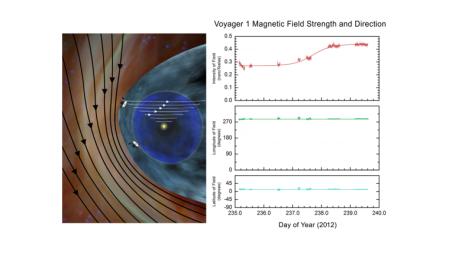
|
Mystery of the Interstellar Magnetic Field (Artist’s Concept)
- Click the image above for a larger view
- Full-Res JPEG (1280 x 720) (78.8 kB)
- Full-Res TIFF (1280 x 720) (2.8 MB)
Caption:
Scientists expected Voyager 1 to measure magnetic field lines traveling in the directions shown by the artist's concept at left, as it crossed into interstellar space. Instead the spacecraft detected much less dramatic changes to the magnetic field lines as indicated by the data on right.
The artist's concept on left is based on theoretical models predicting the direction and strength of magnetic field lines coming from the sun and interstellar space. In reality, Voyager measured almost no change in the direction of the magnetic field lines as it crossed into interstellar space, even though the field became stronger.
Instead, the key evidence that Voyager entered interstellar space came in the form of an increase in plasma density: this thicker soup of electrically charged atoms and electrons is a telltale sign of the region beyond the reach of our sun's wind -- the heliospheric bubble within which we are contained.
These observations render previous theories of the interstellar region's magnetic fields questionable.
Background Info:
The Voyager spacecraft were built and continue to be operated by NASA's Jet Propulsion Laboratory, in Pasadena, Calif. Caltech manages JPL for NASA. The Voyager missions are a part of NASA's Heliophysics System Observatory, sponsored by the Heliophysics Division of the Science Mission Directorate at NASA Headquarters in Washington.
For more information about Voyager, visit http://www.nasa.gov/voyager and http://voyager.jpl.nasa.gov .
Cataloging Keywords:
| Name | Value | Additional Values |
|---|---|---|
| Target | Heliosphere | |
| System | Solar System | |
| Target Type | Heliosphere | |
| Mission | Voyager | |
| Instrument Host | Voyager 1 | |
| Host Type | Flyby Spacecraft | |
| Instrument | ||
| Detector | ||
| Extra Keywords | Artwork, Color, Magnetosphere | |
| Acquisition Date | ||
| Release Date | 2013-09-12 | |
| Date in Caption | ||
| Image Credit | NASA/JPL-Caltech | |
| Source | photojournal.jpl.nasa.gov/catalog/PIA17442 | |
| Identifier | PIA17442 | |
